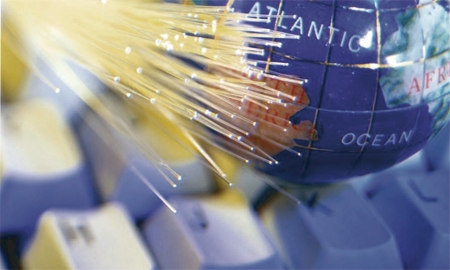With around half a million inhabitants, Suriname is by no means a large market, yet three cellular phone service providers vie for a larger piece of the pie.
The telecom companies enjoy good relations with the Ministry of Tourism, Transport and Communication (MTTC), meeting with the Minister, Falisie Pinas, on a quarterly basis to discuss their plans and activities. “We are also in touch with the Telecommunication Authority Suriname (TAS), the agency in charge of regulating the telecom industry,” says Mr. Pinas. “For potential investors interested in learning about the laws involved, TAS is the first organization that they should approach.”
Telesur, the state-owned telecommunications company, holds the largest share of the market at 60%, while 11 year old Digicel Suriname – part of the Digicel Group Ltd. that has over 12.8 million customers across its 30 markets in Central America, the Caribbean and the Pacific – boasts one-third of the market. In third place, yet slowly gaining in popularity owing to its competitive prices, is Uniqa, the Surinamese affiliate of Curaçao-based UTS.
Mobile telephony was only recently liberalized, and fixed-line and broadband services remain the sole domain of Telesur, which continuously seeks new innovations and the best products and services for its clients. In 2011, as it celebrated its 30th anniversary, Telesur launched the Virtual Class e-Learning, a new brand for broadband Internet (Tele.i), and the Telesur Multimedia Innovation Laboratory.
"We work with companies willing to offer cutting-edge technologies and innovative services that stimulate economic activity in Suriname." Falisie Pinas,
Minister of Transport,
Communication and Tourism |
Last year, Telesur hosted the 27th annual Caribbean Union of Telecommunications Organizations (CANTO) Conference, which is regarded as the Caribbean’s premier telecoms event for industry professionals, academics and regional governments.
At the opening ceremony, President Bouterse underscored the importance of ICT.
“My government believes that the introduction and integration of ICT into the economy and into the field of education is pivotal in the shaping of our future,” he said, urging other Caribbean governments to prioritize further ICT development to achieve regional and global connectivity within a few years’ time. Indeed, the International Telecommunication Union (ITU) has designated 2015 as the year in which half the world’s population should have access to Internet.
“One of our biggest challenges is connecting our whole country to our Internet network,” says Mr. Pinas. “We work with companies willing to offer cutting-edge technologies and innovative services that stimulate economic activity in Suriname.”
The first annual Virtual Educa Caribbean was held from February 29 to March 2 this year in Paramaribo to coincide with the VII Inter-American Meeting of Ministers of Education, and was organized by the Organization of American States (OAS).
Under the banner of “The use of ICTs and innovative approaches to enhance education”, the Virtual Educa Caribbean event gathered hundreds of people from the education sector, from government and from the general public. Teachers were trained in new technologies and government officials learned about regional and international educational initiatives. Members of the general public were introduced for the first time to the exciting 21st Century Virtual Classroom.
Anton de Kom University was also one of the coordinators of the Virtual Classroom launch. “Hosting the Virtual Educa Conference allowed Anton de Kom University to broaden its network, establishing new contacts all over the Latin American mainland,” says its Chancellor, Dr. Ryan Sidin.
Meanwhile, Telesur continues taking steps to expand Suriname’s physical digital connectivity with the region with the Suriname Guyana Submarine Cable System (SGSCS). Constructed by Huawei Marine Networks and Global Marine Systems, the 776-mile long cable is a joint undertaking by Telesur and Guyana Telephone and Telegraph Co.
“This system will allow for the deployment of cutting-edge communications services for the people, businesses and institutions of these countries,” says Ian Douglas, Managing Director of Telecoms for Global Marine Systems.

0 COMMENTS